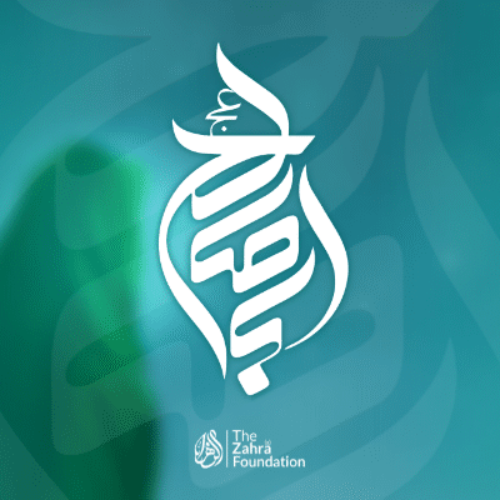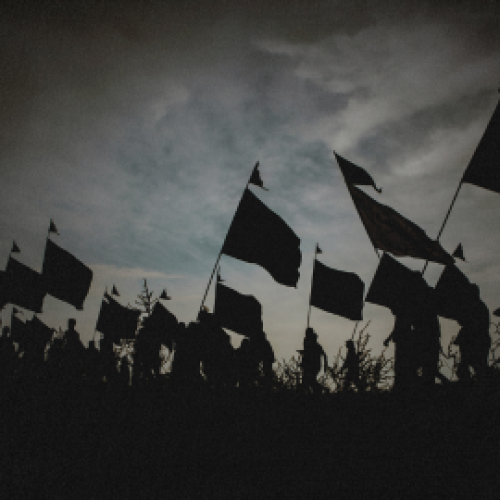Dua (supplication) is not just prayer – it’s an act of worship that connects our hearts directly to Allah (swt). It helps us transform grief into peace, seek mercy, and find strength amid trials by turning to divine guidance and solace.
Dua isn’t just words, it’s worship. It’s a sacred conversation that brings peace in pain and strength in struggle.
The Ahlulbayt (as) showed us how to turn to Allah (swt) with full hearts, especially when we feel overwhelmed by trials, uncertainty, or loss.
Dua (supplication) is a form of worship that connects the heart to Allah (swt). When recited with understanding, it transforms our pain into peace and our hope into strength. It allows us to pour out our grief, seek His mercy, and find stability when the world feels uncertain.
Imam al-Ridha (as) is reported to have said, “I urge you to use the weapon of the prophets.” When asked what that weapon was, he replied, “Supplication.” (Mīzan al-Ḥikmah, n.4045)
The duas of the Ahlulbayt (as) carry us through the heaviest trials. They begin by glorifying Allah (swt), then lead into heartfelt requests, teaching us to rely on Him (swt) completely, especially in moments of deep affliction. In today’s world, where hardship surrounds so many, these prayers offer not just words, but a lifeline.
Let us explore five duas the Holy Household (as) have taught us to navigate through tough times.
1. Dua Mashlool
Dua Mashlool, the Supplication of the Paralyzed, is attributed to Imam Ali (as). It is also known as the supplication of the youth stricken for his sin.
The Imam (as) gave this dua to a paralyzed man who cried in repentance over mistreating his father, advising him to recite it after his Isha prayer. After reciting the dua, the young man was relieved of his paralysis.
This dua calls out to Allah (swt) through many of His names and attributes, one after another, in a manner that leaves us in awe but comfort.
One passage of the duas says:
يَا مَنْ حَيْثُ مَا دُعِي اجَابَ، يَا مُفَتِّحَ ٱلابْوَابِ
“O Opener of all doors! O He Who answers wherever He is called upon!”
Through these names, we ask Allah (swt) to relieve us of whatever afflictions we are facing, whether it’s poverty, sickness, disputes, or forgiveness of our sins.
2. Dua 54 of Sahifa Sajjadiyah
Sahifa Sajjadiyah is a collection of various duas and munajat (whispered prayers) taught to us by the 4th Imam, Ali Zain Al-Abideen (as). Dua 54 from this collection is his supplication to remove worries and anxieties.
The dua begins by invoking Allah (swt) by saying:
يَا فَارِجَ الْهَمِّ وَكَاشِفَ الغَمِّ
“Reliever of worry! O Remover of grief!”
After sending blessings on the Ahlulbayt (as), the dua mentions the weaknesses and deficiencies of the human being who is asking their Creator to remove these worries from their life.
This dua shows the importance of relying on Allah (swt) in all aspects of our lives. When we are in proximity to Him (swt), we will be able to overcome any trial and tribulation thrown at us.
3. Ziyarat Ashura
Ziyarat Ashura is attributed to Imam Muhammad Al-Baqir (as). It is a declaration of loyalty to Imam Hussain (as) and the Ahlulbayt (as).
It is highly recommended to recite for 40 days to overcome the afflictions and tribulations that we face in our lives. Shaykh Abdul Mun’im Kobeissi also mentions that one of the benefits of reciting Ziyarat Ashura is the removal of tribulations from our lives.
The ziyarat starts off by sending salutations on the Master of Martyrs, Imam Hussain (as):
أَلسَّلاَمُ عَلَيْكَ يَا أَبَا عَبْدِ اللّٰهِ
“Peace be upon you, O Aba Abdillah.”
We all face hardships in life. When we think about what Imam Hussain (as) and the Caravan of Honour (as) went through in Karbala, our grief automatically shifts to theirs.
The ziyarat mentions:
يَا أَبَا عَبْدِ اللّٰهِ، لَقَدْ عَظُمَتِ الرَّزِيَّةُ وَجَلَّتْ وَعَظُمَتِ الْـمُصِيبَةُ بِكَ عَلَيْنَا وَعَلىٰ جَمِيعِ أَهْلِ الإِِسْلاَمِ، وَجَلَّتْ وَعَظُمَتْ مُصِيبَتُكَ فِي السَّمٰوَاتِ عَلىٰ جَمِيعِ أَهْلِ السَّمٰوَاتِ،
“O Aba Abdillah! Surely the tribulations are great and unbearable, and your tragedy is great for us, and for all the people of Islam and unbearable and great is your tragedy in the heavens and for all of the dwellers of the heavens.”
This powerful ziyarat helps us to not only build a connection to Imam Hussain (as), but to Allah (swt) and the Ahlulbayt (as) as well through Aba Abdillah (as). When we connect to Imam Hussain (as) and understand his status, we can overcome any despair in our lives.
The Prophet (saww) is reported to have said, “By He (swt) who sent me as a Prophet with truth that the remembrance of Hussain ibne Ali (as), is greater in heaven than on the earth. On the right of Allah’s (swt) throne, he [Hussain (as)] is written as ‘the lamp of guidance and the ship of salvation’.” (Bihar al-Anwar, v.36)
4. Dua Tawassul
Recited every Tuesday night, Dua Tawassul is the supplication of seeking intercession through the Ahlulbayt (as). Shaykh al-Tusi mentions this dua in his book, Misbah al-Mutahajjid, and attributes it to the 11th Imam, Hassan Al-Askari (as).
In this dua, we ask Allah (swt) to grant us our legitimate desires and get us through trials by invoking the names of the 14 Masumeen (as) and asking for their intercession.
The following lines of this line are repeated throughout when invoking each of the Masumeen:
اِنّا تَوَجَّهْنا وَاسْتَشْفَعْنا وَتَوَسَّلْنا بِكَ اِلَى اللهِ وَقَدَّمْناكَ بَيْنَ يَدَيْ حاجاتِنا، يا وَجيهاً عِنْدَ اللهِ اِشْفَعْ لَنا عِنْدَ اللهِ
“We are turning our faces toward you, seeking your intercession and your advocacy for us before Allah (swt); and we are presenting you (as our intermediary) for the settlement of our needs. O well-esteemed with Allah (swt), intercede for us before Allah (swt).”
The lofty status of the Ahlulbayt (as) allows them to be intercessors, as they are the closest to Allah (swt). The Holy Qur’an says in Surah Taha:
يَوۡمَئِذٖ لَّا تَنفَعُ ٱلشَّفَٰعَةُ إِلَّا مَنۡ أَذِنَ لَهُ ٱلرَّحۡمَٰنُ وَرَضِيَ لَهُۥ قَوۡلٗا
“On that day, the intercession will not benefit anyone except (through) a person whom the Beneficent (swt) gives permission and whose word He (swt) approves.” (20:109)
The Prophet (saww) confirms this permission granted to the Ahlulbayt (as) as reportedly said, “The Imams from the progeny of al-Hussain (as) are such that whoever obeys them has obeyed Allah (swt), and whoever disobeys them has disobeyed Allah (swt). They are the Firm Rope (to Allah), and they are the means of recourse to Allah (swt).” (Uyun Akhbar al-Ridha, v.2)
5. Dua Faraj
Dua Faraj is a supplication attributed to Imam Mahdi (ajtfs), which he taught to a man named Abul Hassan Muhammad ibn Ahmad ibn Abi Al-Lais. This man was seeking refuge in Baghdad and feared for his life. He was saved due to this dua.
It is a short but powerful call for relief and the reappearance of Imam Mahdi (ajtfs). The dua ends with this cry to the Imam (ajtfs);
يَامَوْلَانَا يَاصَاحِبَ الزَّمَانِ
أَدْرِكْنِيْ أَدْرِكْنِيْ أَدْرِكْنِيْ
اَلسَّاعَةَ اَلسَّاعَةَ اَلسَّاعَةَ
اَلْعَجَلَ اَلْعَجَلَ اَلْعَجَلَ
“O our Master, O Master of the Time!
Help, help, help!
Rescue me, rescue me, rescue me!
This moment, this moment, this moment!”
It reminds us that even in hardship, especially with all the turmoil that is currently present, hope lives in the promise of his (ajtfs) return.
In every generation, the Ahlulbayt (as) gave us duas to turn to when trials felt too heavy to bear. These five supplications remind us that we are never alone in our pain or despair. Our faith gives us words to rise through grief, stay patient through hardship, and hold on to hope.
At the core of our hope is Sahib Al-Asr (ajtfs). He knows of our afflictions, and he will be the one to bring us relief.
While we reflect on these duas, provide relief in the Imam’s name (ajtfs) to displaced families.
FAQ
Here are five key duas:
- Dua Mashlool – from Imam Ali (as), known for miraculous healing and comfort in sin-related guilt.
- Dua 54 of Sahifa Sajjadiya – prayer by Imam Sajjad (as) for removing worry and grief.
- Ziyarat Ashura – devotional recitation attributed to Imam al-Baqir (as), known for resilience against tribulations.
- Dua Tawassul – practiced every Tuesday; it invokes intercession of the 14 Infallibles (as) through Imam Hasan al-Askari (as).
- Dua Faraj – supplication taught by Imam Mahdi (ajtfs) for relief and hope during hardshi
Dua Mashlool calls upon Allah (swt) using His divine attributes (e.g., “Opener of all doors!”). Imam Ali (as) recommended it to a repentant paralyzed youth, and after recitation – paralysis lifted. It remains a powerful prayer for overcoming affliction.
Also known as “Reliever of worry and remover of grief,” Dua 54 is a heartfelt plea by Imam Sajjad (as) to alleviate stress, anxiety, and emotional burdens. It emphasizes soul connection with Allah (swt) and reliance on His mercy.
Ziyarat Ashura is a solemn expression of loyalty to Imam Hussain (as). Reciting it – especially for 40 days – can deepen spiritual resilience, soften the heart, and remove tribulations by connecting us to the sacrifice and unwavering faith of Karbala’s Imam.
Dua Tawassul is recited every Tuesday night. It seeks the intercession of the Ahlulbayt (14 Masumeen) through Imam Hasan al-Askari (as). By appealing to their nearness to Allah (swt), believers find assistance and fulfillment of legitimate needs.
Dua Faraj, attributed to Imam Mahdi (ajtfs), is a cry for divine relief: “Help, help… Rescue me this moment.” It strengthens hope in Allah’s promise of deliverance, especially amid hardship, and reminds believers that aid is near.






